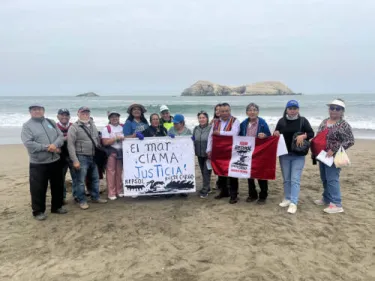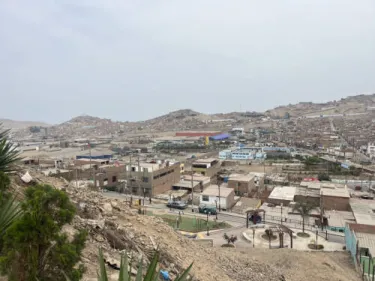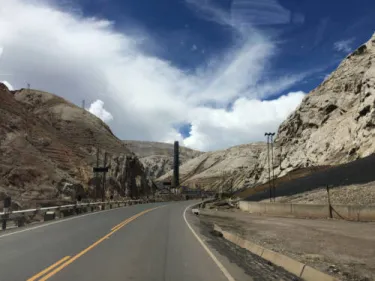Struggling for Abundant Life
A Letter from Jed and Jenny Koball, serving in Peru
Subscribe to our co-worker letters
I came that they may have life and have it abundantly. –John 10:10
“El mar no se vende! El mar se defiende!” (The sea is not for sale! The sea must be defended!).
Standing on the shores of Ventanilla just minutes north of Lima in the region of Callao, Maria Chirinos leads her fellow community activists in a chant to express their dismay at the mounting risks to human and environmental health in their neighborhoods.

In January of 2022, two oil spills from a refinery owned by the transnational company REPSOL contaminated the beaches of Callao. The immediate impacts were seen as the crude oil washed ashore, blackening the sands, and entrapping wildlife. A superficial clean-up ensued, but the denser oil still rests on the seabed, poisoning the waters, and affecting the ecosystems, community life and livelihoods. Many who live on the shores of Callao are fisherfolk and have fled the area in search of new seas to fish or new means of feeding their families. Some have stayed, knowing the risks to their own health as well as to the people who consume their fish catch.
However, the oil spills are not the only issues impacting human and environmental health in Callao. A few miles inland at the heart of the industrial zone of this port city, storage containers leak toxins from minerals mined in the Andes and waiting to be shipped around the world; chemical and pharmaceutical companies discharge their waste into the Chillón River (one of the three major rivers that feed the Lima metropolitan area); battery production emits toxins into the air that have been shown to generate excessive levels of lead in nearby grade school children; and, mining for rocks used in asphalt and cement eats away at important natural reserves and unique coastal ecosystems.

In 2021 Maria sought out Red Uniendo Manos Peru (RUMP), our global partner, and asked for help in organizing her community in the interest of advocating for human and environmental health. Such work has been at the heart of RUMP´s mission going back more than 20 years. Rooted in Jesus’ hope of abundant life for all people and informed by Andean indigenous spiritualties reflected in the modern concept of Buen Vivir (“good living” or “plentiful life”) the pursuit of human and environmental health values justice within society, and balance with natural surroundings. In this way, the abundant life that God wills for us is predicated not on the acquisition of wealth or development of the world, but rather on equitable relationships among peoples and harmony with all of nature. Without clean air, land and water, we cannot live in peace; and without justice in society, we are doomed to destroy the one common home we share.
For RUMP the pursuit of abundant life began in the Andean town of La Oroya, known as one of the five most contaminated places in the world due to the toxic emissions from a metallurgical smelter once owned by a U.S. company. In La Oroya 98.6% of children were shown to have levels of lead in their blood far surpassing World Health Organization thresholds. Despite such obvious indicators of generational crisis, violent tension existed in the town about what to do: support the company and its promise of prosperity or, stand in opposition to the company and together with mothers and children in pursuit of life?
The Red Uniendo Manos Peru chose life.

Eventually, the smelter shut down in 2009 when it declared bankruptcy following years of our partner and community leaders advocating for the enforcement of environmental regulations, but that was not the end of the story as the toxins it emitted over decades still resided in the soils. And so, the focus of the work turned to advocating for specialized health care for the residents of La Oroya, remediation of the soils, and the establishment and enforcement of regulations to ensure such contamination never happened again. In 2012, RUMP drafted and got passed a regional law for Human and Environmental Health for Communities Affected by Toxic Metals. And yet, by 2017 it became clear that this regional law could not be implemented without changes to national law.
Recognizing the limitations of its influence at the national level, RUMP reached out to other regions of the country also affected by toxic metal contamination from the mining industry. With the support of other organizations and allies in civil society they helped organize the National Platform for Peoples Affected by Toxic Metals and Metalloids which today represents 17 regions of the country (and 11 million people – a third of the population of Peru) that have been determined to be at risk from toxic metal contamination, largely due to mining, oil and other extractive activity. Using the regional law written by RUMP as a model, together they drafted a national Specialized Human and Environmental Health Law. This law was passed in 2021 and mandates that each region of the country design health care and environmental protocols and practices to meet the unique demands of contamination from toxic metals in their respective locales.
The fight today is to get this national law implemented in each region of the country. With the people of La Oroya well organized in this effort, the RUMP has accepted the invitation of Maria Chirinos and her fellow community leaders who make up the newly established Regional Platform of Callao for Human and Environmental Health. Fundamental to this work is the building of solidarity - not just in Callao but across Peru and throughout the world. The powers of death and destruction that operate in Peru are global in nature and thus demand a global proclamation for life. Over the years you have graciously accompanied and supported the people of La Oroya, and now with tremendous gratitude, I invite you to walk with us in Callao. Your voice, your presence, your generosity, and your courage are invaluable in this struggle for abundant life!
In solidarity (and on behalf of Jenny),
Jed
Please read this important message from Director of World Mission Rev. Mienda Uriarte
Then the King will say to those at his right hand, ‘Come, O blessed of my Father, inherit the kingdom prepared for you from the foundation of the world; 35 for I was hungry and you gave me food, I was thirsty and you gave me drink, I was a stranger and you welcomed me, 36 I was naked and you clothed me, I was sick and you visited me, I was in prison and you came to me.’ Matthew 25: 34-36
Dear friends,
Great things are happening in World Mission! As you know from the letters you’ve been receiving, our mission co-workers are at the forefront of showing us what Matthew 25 looks like in the U.S. and in the wider world. They are addressing issues related to eradicating systemic poverty, building congregational vitality and dismantling structural racism. Together with our partners, mission co-workers are engaged in life-transforming ministries in 80 countries around the world. Here are just a few examples:
As an education consultant in the Democratic Republic of Congo, José Jones assists the Presbyterian Community of Kinshasa (CPK) education department in the development, implementation and evaluation of strategic plans to strengthen the church’s primary and secondary education programs for more than 350 schools.
Based in Manila, Rev. Cathy Chang works closely with the United Church of Christ in the Philippines (UCCP) and other partners in ministry to engage programs and networks across Asia that advocate for people vulnerable to forced migration and human trafficking.
Nadia Ayoub works alongside our Greek partners as they faithfully hold to the biblical call to welcome the stranger. Nadia serves with Perichoresis, a ministry of the Evangelical Church of Greece that provides housing and support to refugees; most of whom have come to Greece from Arabic-speaking countries.
Joseph Russ strengthens and supports a network of partners working in El Salvador, Guatemala and Honduras to address migration issues in the Northern Triangle. Based on the needs people on the ground identify, Joseph empowers U.S. congregations to engage in advocacy related to Central America and immigration reform.
Revs. Drs. Noah Park and Esther Shin serve as professors at the Evangelical Theological Seminary in Cairo (ETSC). ETSC graduates work toward revitalizing congregational ministries in Egypt and work with refugee and peace ministries in various countries in the Middle East.
lease consider giving an extra gift this year to support our mission co-workers as they walk alongside our partners and help shape a more life-giving, equitable and hopeful world!
Prayerfully,
Rev. Mienda Uriarte, Director of World Mission
Presbyterian Mission Agency
Presbyterian Church (U.S.A.)
To give online, visit https://bit.ly/23MC-YE.
Honorary gifts can be made by checking the box and writing the mission co-worker’s name in the comment field online.
